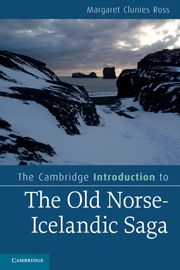Book contents
- Frontmatter
- Contents
- Tables
- A preface on practical issues
- Acknowledgements
- Abbreviations
- Chapter 1 Medieval Iceland
- Chapter 2 What is an Old Norse-Icelandic saga?
- Chapter 3 The genesis of the Icelandic saga
- Chapter 4 Saga chronology
- Chapter 5 Saga subjects and settings
- Chapter 6 Saga mode, style and point of view
- Chapter 7 Saga structures
- Chapter 8 The material record: how we know the sagas
- Chapter 9 Changing understandings of the sagas
- Notes
- Glossary of technical terms
- Guide to further reading
- References to volumes in the Íslenzk fornrit editions of Icelandic sagas
- Index
A preface on practical issues
Published online by Cambridge University Press: 05 June 2012
- Frontmatter
- Contents
- Tables
- A preface on practical issues
- Acknowledgements
- Abbreviations
- Chapter 1 Medieval Iceland
- Chapter 2 What is an Old Norse-Icelandic saga?
- Chapter 3 The genesis of the Icelandic saga
- Chapter 4 Saga chronology
- Chapter 5 Saga subjects and settings
- Chapter 6 Saga mode, style and point of view
- Chapter 7 Saga structures
- Chapter 8 The material record: how we know the sagas
- Chapter 9 Changing understandings of the sagas
- Notes
- Glossary of technical terms
- Guide to further reading
- References to volumes in the Íslenzk fornrit editions of Icelandic sagas
- Index
Summary
General aim of this book
The aim of this book is to offer an up-to-date analysis of the medieval Icelandic saga genre and to review major issues to do with its origins and development, its literary character and identity, its material existence in manuscripts and printed editions, and its changing reception from the Middle Ages to the present time. This book is about the saga genre in general but also about the various identifiable sub-genres that make it up. One of the book's themes is that many general books on the subject of the Icelandic saga are actually about only one sub-genre, the ‘sagas of Icelanders’ (Íslendingasögur) or family sagas, as they have sometimes been called in English. Some of the other sub-genres, like the ‘sagas of ancient time’ (fornaldarsögur) and ‘sagas of knights’ (riddarasögur) in particular, have been rather neglected during the twentieth century, for reasons that I shall try to explain. Although much of the discussion here perforce deals with sagas of Icelanders, because they have been the main subject of modern research and theorising, I have not confined myself to this sub-genre.
In the chapters that follow, I identify general characteristics of the saga genre as well as the characteristics that differentiate one sub-genre from others. I also propose that modern readers must be prepared to be flexible and non-judgemental about what I call in Chapter 6 the ‘mixed modality’ of much saga writing, which I argue reflects medieval attitudes rather better than a more compartmentalised distinction between ‘classical’ and ‘post-classical’, ‘realistic’ and ‘fantastic’ saga types that have been the anchor-points of much literary analysis and debate over the last one hundred years or so.
- Type
- Chapter
- Information
- The Cambridge Introduction to the Old Norse-Icelandic Saga , pp. ix - xiiPublisher: Cambridge University PressPrint publication year: 2010



